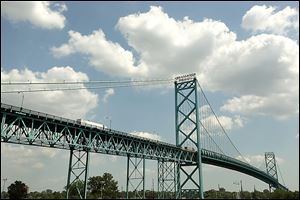
MICHIGAN STATEWIDE BALLOT PROPOSALS
Voters to weigh bridge, taxes, bargaining issues
11/4/2012
Ambassador Bridge owner Matty Moroun has spearheaded a ballot proposal to require a public vote to build a competing international crossing between Detroit and Windsor, Ontario.
Michigan voters will face the busiest ballot in 25 years with six statewide proposals to decide on Tuesday.
They include issues that would require a vote on a new public bridge to Canada, enshrine collective-bargaining rights in the Michigan Constitution, and require a two-thirds legislative supermajority for state tax increases.
Five of the proposals seek to amend the constitution, while the sixth would repeal a state law.
Two of ballot initiatives are tied to trucking mogul Manuel “Matty” Moroun and the billionaire’s efforts to fight a proposed new bridge between Detroit and Windsor, Ontario, that would compete with his Ambassador Bridge. Mr. Moroun would lose a competitive disadvantage if the new bridge were built.
READ MORE: The Blade 2012 Voters Guide
If passed, the measure could delay or derail plans for the $2.1 billion New International Trade Crossing and other projects.
If approved, Proposal 6 would change the constitution to require voter approval of “new international bridges or tunnels for motor vehicles” before the state could spend any money on land, design, financing, and construction.
On Proposal 5, voters are being asked to require a two-thirds vote of the state Legislature to raise state taxes. If the Legislature can’t get a two-thirds vote, a tax increase proposal could be put on a ballot for voters to decide.
Mr. Maroun’s family is funding campaigns urging passage of the bridge and tax-restraint issues and has spent millions of dollars in television ads promoting the bridge amendment.
A coalition of business and taxpayer groups is countering with a vote-no campaign to thwart Mr. Moroun.
Gov. Rick Snyder, who struck the deal with Canada on construction of the new crossing, and many business groups favor the project, but it has failed to gain approval in the GOP-controlled Legislature.
Mickey Blashfield, a top Moroun aide and head of the People Should Decide, the group backing Proposal 6 and sponsor of the initiative, said Michigan residents should have a say in how public money is spent on international crossings.
“As a recently released financial analysis shows, this bridge will be a burden for taxpayers for decades and a massive boondoggle for the state. The financial risks and long-term costs are not worth the extremely uncertain financial benefits a second bridge might bring,” he said. “Because of that, the choice whether to build it should be up to the people, not politicians, to decide. Voting yes on 6 will go a long way in accomplishing just that.”
Tom Shields, spokesman for Citizens Protecting Michigan’s Constitution, a coalition of business, labor, and government groups that support the new bridge plan, said the new crossing would be paid for by Canada, create an estimated 10,000 construction jobs, and ease the transportation flow of goods between Ontario and Michigan.
Among the beneficiaries, he said, would be auto plants and parts suppliers to car companies in Ohio and Indiana because the new bridge would eliminate delays that exist on the Ambassador Bridge.
“We don’t have redundancy on the most important crossing in North America,” he said. “It really is an inefficient process. The system doesn’t work anymore and doesn’t meet modern demands.”
Proposal 2 would enshrine collective bargaining in the state constitution and make Michigan the first state in the nation with a constitutional guarantee of collective-bargaining rights
Nick DeLeeuw, spokesman for Protecting Michigan’s Constitution, said passage of the issue would overturn about 170 laws, including protection for students that require suspension of teachers accused of having sex with students and drug trafficking and background checks for bus drivers.
“It will invalidate existing and future state laws that conflict with collective bargaining,” said Mr. DeLeeuw, whose group is supported by the Michigan Chamber of Commerce.
But Dan Lijana, spokesman for Protect Working Families, a coalition of unions which worked to get the initiative on the ballot, rebuts claims that Proposal 2 would repeal existing laws. Instead, he said it would protect workers from corporate special interests and restore the ability for employees to bargain.
“Working families are under attack in many ways,” he said. “The amendment will put collective bargaining as a fundamental right in the constitution.”
Proposal 1 is a referendum on whether to keep the new emergency manager law, also known as Public Act 4, approved last year by the legislature.
A no vote on the issue would repeal the law, which gives authority to the state to send emergency managers to oversee financially distressed cities and school districts.
The managers have broad powers over units of government found to have a financial emergency, including the authority to reject, modify, or terminate terms of an existing contract or collective-bargaining agreement.
Proposal 3 asks voters to amend the constitution to require that at least 25 percent of Michigan’s electricity come from clean renewable sources, such as wind, solar, and hydro, by the 2025 and would allow utility providers to limit rate increases to 1 percent per year to meet the standard.
If approved, Proposal 3 would supersede a 2008 law that requires 10 percent of the state’s energy to come from renewable sources by 2015.
Proposal 4 would amend the constitution to create a registry of home health-care aides, require background checks for workers, and give them limited collective-bargaining rights.
Contact Mark Reiter at: markreiter@theblade.com or 419-724-6199.